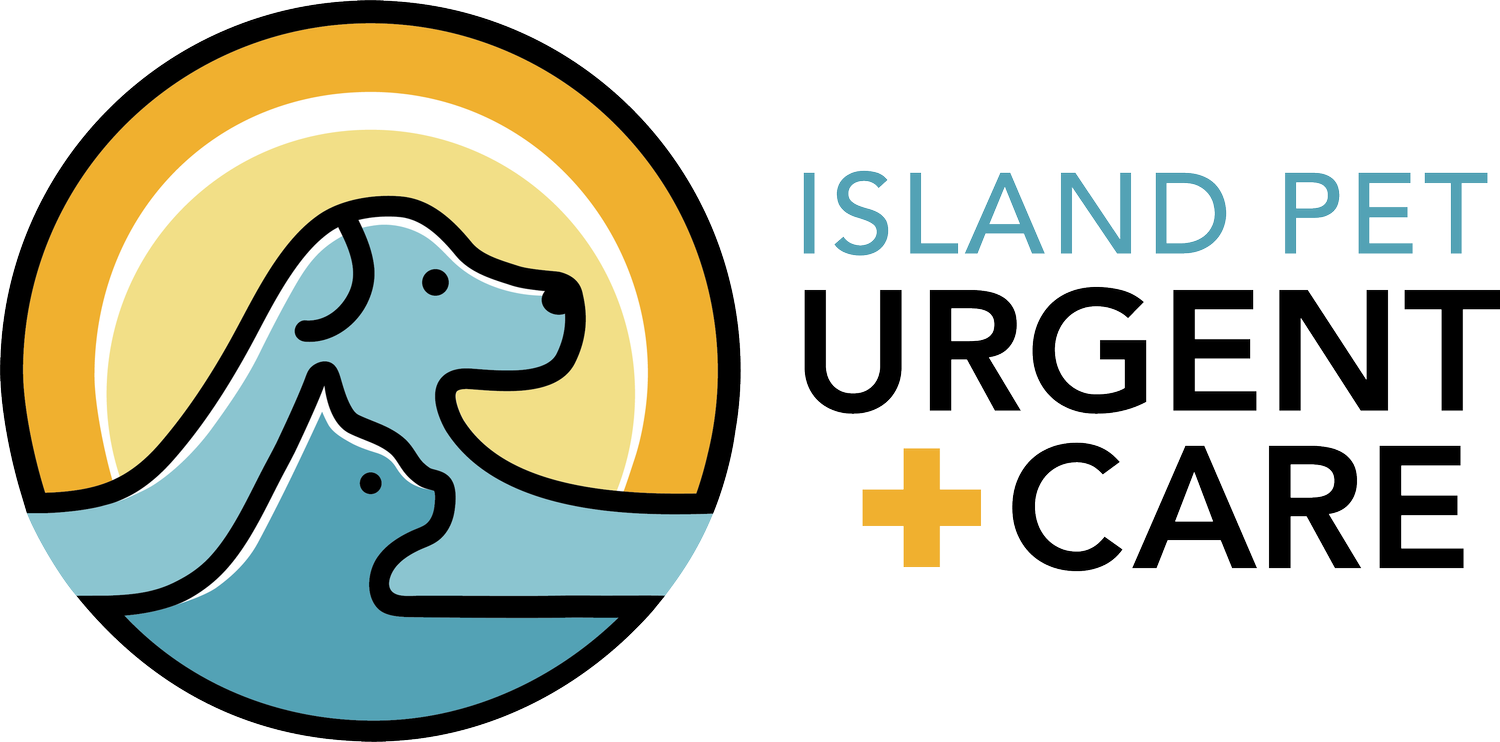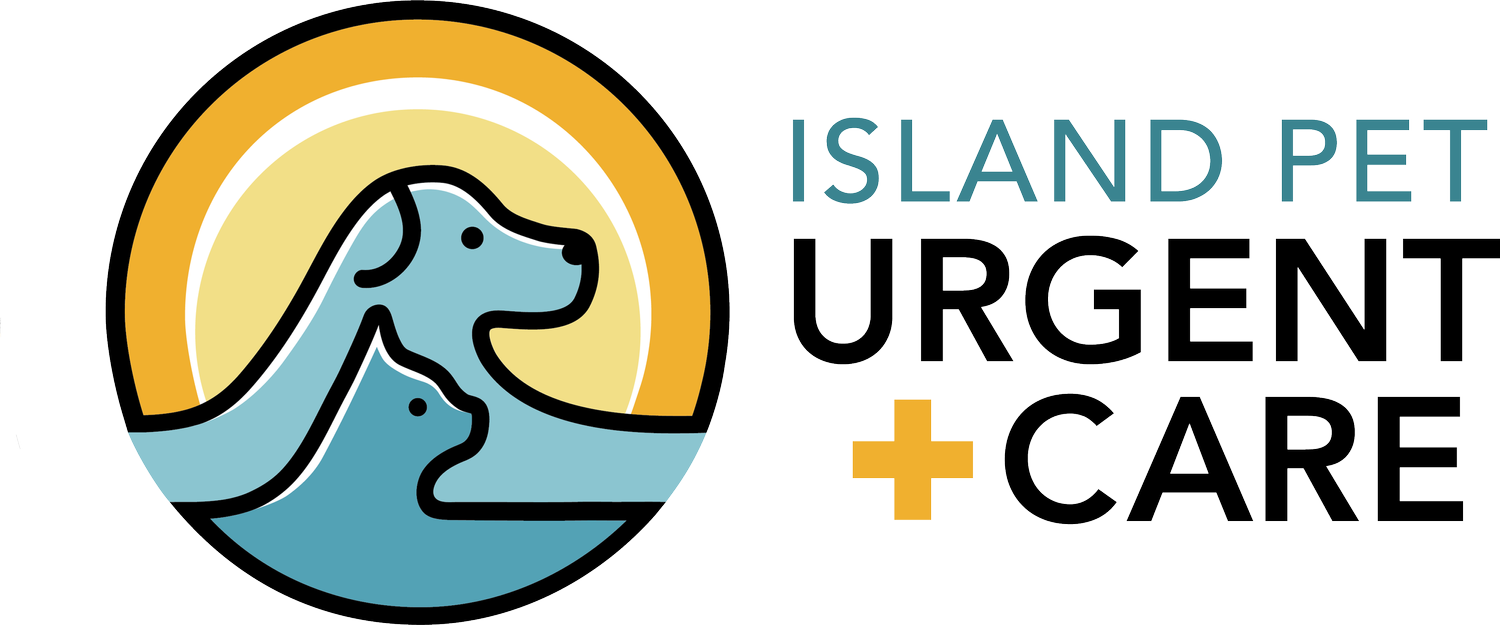Vomiting and Diarrhea in Cats and Dogs: Gastrointestinal Upset
Gastrointestinal upset in dogs and cats are one of the main presenting complaints we see at Island Pet Urgent Care. These symptoms can result from a number of factors and oftentimes we need to perform some testing to determine and treat the underlying cause.
The biggest contributors to GI upset are:
Stressors
Environmental (ex: changes in housing, new family members or pets, excessive heat, loud noises)
Physical (ex: motion sickness from car rides, excessive exercise, pain, anxiety)
Changes in diet (ex: new treats, food, table scraps)
Dietary indiscretion (plant ingestion, salt water, foreign material)
Medications (ex: antibiotics, NSAIDs, chemotherapy)
Parasites (I know, gross, but worms can definitely cause gastrointestinal upset).
Common signs you can see if your pet is experiencing GI upset:
Signs of gastrointestinal upset may vary by species and individual pet.
For dogs, signs may include:
Inappetence
Vomiting
Diarrhea
Panting
Restlessness
Frequent requests to go outside
Eating grass
Licking objects (floor or other abnormal surfaces)
Drooling
Turning head away when offered food
Accidents inside the house.
For cats, signs may include:
Drooling
Hiding
Vomiting
Diarrhea
Inappetence
Can vomiting and diarrhea be treated at home?
In some mild cases, gastrointestinal upset can be treated at home. If your pet has mild diarrhea (loose/soft stools that are light brown in color with no blood) or one episode of vomiting, there are a few things you can try at home prior to seeking medical attention.
For diarrhea:
At home care consists of feeding a bland diet (1 part protein to 2 parts starch) for 3-5 days. Some protein options include chicken breast, boiled ground beef, turkey breast, low fat cottage cheese, low fat plain yogurt). The most common suggestions for starch are white rice or pasta. When preparing a bland diet, it is important to avoid using oils, butters, or spices (including salt and pepper). It may be easiest to prepare a large batch of the bland diet and freeze individual servings to minimize time spent in the kitchen. There are also great canned meat options available at the grocery store (avoid added oils and spices).
If your pet’s diarrhea improves after starting a bland diet, continue feeding a bland diet until stools have returned to normal before slowly transitioning back to their normal food. This can be achieved by increasing the amount of normal diet while decreasing the bland diet (so there is no change in volume) over 3 days to minimize the chance of another episode of diarrhea.
For vomiting:
If your pet vomits once, remove any food and/or water for 2 hours. After 2 hours of no vomiting, you can try to offer a small amount of water (~1 tbsp) every 30 minutes. If after another 2 hours there is no further vomiting, you can try a small amount (~1-2 tbsp) of a bland diet. Continue feeding small amounts of a bland diet and offering small amounts of water (~1⁄4 cup) frequently throughout the day. You should be able to return your pet to their normal feeding and drinking schedule the next day.
When should I seek medical attention for my pet?
We always love to see you and your pet if you are concerned about their health! If symptoms are mild or you are unable to have your pet seen on an emergent basis, having your pet examined by a veterinarian within 24-48 hours after the start of a mild gastrointestinal upset event is recommended. If your pet is vomiting more than once or is having multiple episodes of diarrhea it is recommended to have your pet seen immediately. Persistent vomiting and diarrhea can lead to severe dehydration and potentially life threatening imbalances if left untreated.
What can I expect at an urgent care visit for gastrointestinal upset?
At Island Pet Urgent Care, triage happens at check in! A skilled technician will gather information from you about your pet including a complete history, pre existing conditions, previous surgeries, medications, and other concerns, along with gathering your pet’s vitals prior to speaking to the doctor. The veterinarian will assess your pet’s hydration status, perform a physical exam, and discuss a personalized treatment plan with you prior to any treatments performed so that there are not any surprises. The veterinarian might suggest running some tests to evaluate your pet’s health. In most cases of vomiting and diarrhea, we will administer fluids (intravenous or subcutaneous), an anti nausea medication, and medications to take at home to help slow diarrhea, depending on the severity and cause of the event.
If you are ever worried about your pet for any reason, please call Island Pet Urgent Care at 843-386-5404 or stop by! No appointment needed because we know comfort can’t wait!
-Maria Van Swol, CVT

